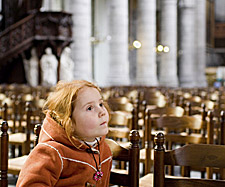 Australian Anglican churches have made great strides creating child safe environments but there are still challenges ahead, a Sydney Anglican has told an international congress today.
Australian Anglican churches have made great strides creating child safe environments but there are still challenges ahead, a Sydney Anglican has told an international congress today.
Philip Gerber, Director of Professional Standards for Sydney, Armidale, Grafton and Newcastle, is addressing delegates at the 16th International Congress of Child Abuse and Neglect on the need to continue implementing standards to protect children.
"[Many dioceses] still have a long way to go," Mr Gerber writes in a paper forwarded to Sydneyanglicans.net.
“[But] overall the Anglican Church of Australia has come a long way in the last few years in putting policies, procedures and practices in place to provide a safe place for and to protect children,” he says.
Mr Gerber has delivered the comments while representing the Sydney Diocese at the congress, held at the University of York.
As Sydney’s Professional Standards ‘expert’ Mr Gerber has been advising several other diocese on creating child-friendly environments.
He says vital steps for making churches child friendly include ensuring clergy and church workers are properly screened, adopting clear guidelines for children's ministry and organising regular training for staff and volunteers.
He adds that child abuse needs to be responded to properly, victims need to receive ongoing support and perpetrators "and persons of suspicion' should be supervised and held accountable.
Community connections mean churches will struggle
Mr Gerber says Australia's second-largest denomination with its extensive social welfare programs, schools, aged facilities, parish and organisational networks means Anglican churches will always run the risk of attracting the attention of child abusers.
Mr Gerber says the positions of power and trust co-existing with ready access to large numbers of children are two major factors that could lead to child abuse occurring.
Informed vigilance is the only appropriate response.
The Diocese of Sydney has recorded 134 known or alleged clergy or church worker abusers over a 50-year period.
"Thankfully the group of abusers is proportionally small," he says.
It is currently National Child Protection Week and a new study from the NSW Department of Community Services has found that one in three Australians believe a child they know has been abused or neglected but 43 per cent do not report it.
Sydney sets Child protection standard
There has been a tightening of professional standards for Anglican clergy and church workers since the 1990s in the wake of sex abuse scandals that have led to criminal convictions, government enquiries and high-level resignations.
A uniform strategy for the protection of children in a church context was adopted at the General Synod (national church parliament) in 2004, including a recommended code of conduct, Faithfulness in Service.
The code of conduct was a Sydney initiative and the diocese was the first to see it implemented.
However, not all 23 dioceses have implemented the code at a local level. A number are still working through the process while others are drafting or have adopted their own codes.
"This is due principally to local idiosyncrasies of diocesan culture, management and practice and a wide variation in resources," Mr Gerber says.
Garth Blake SC, chairperson of the General Synod’s Professional Standards Commission, says the Australian church ‘as a whole’ is coming on board with the code.
“It’s a slow process but I’m hoping by 2007 almost everyone would have adopted it,” Mr Blake says.
Patty Mutton, a member of Sydney Diocese's Safe Ministry Board and advocacy group Tamar, is hoping to see even more effort go into addressing the impact abuse has on family members and victims’ church communities.
"There's a long way to go in understanding not only the impact on the victim but the issue of secondary victims. They need support, not judgement.
"I still feel a lot of churchgoing Anglicans would find it hard to believe, hard to accept that [abuse] happens in the church " their local church and churches everywhere.
"There’s still a long way to go to make people see how insidious the problem is. Education and understanding is the drum we've been beating for years."



















